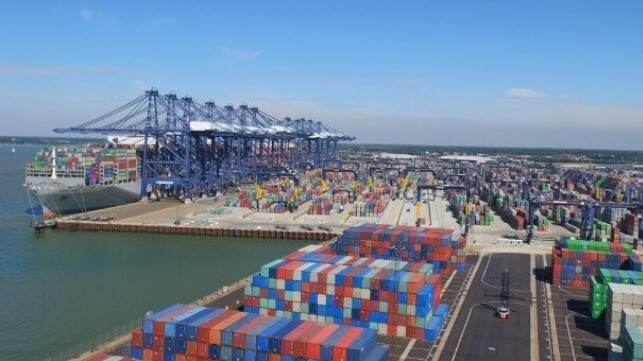As Felixstowe Strike Appears Certain, $800M in Lost Trade is Forecast

There has been no further progress on the plans for a strike by the hourly dockworkers at the UK’s Port of Felixstowe, making it appear increasingly likely as many as 1,900 people will fail to show up for their shifts starting Sunday. As the reality of further disruption to the already squeezed supply chain sets in, forecasts are that it could result in over $800 million in trade being disrupted with the potential for continuing effects until the labor dispute is settled. In addition, there is the news that Liverpool is set to strike in the following weeks while other ports including those in Germany are yet to resolve their labor disputes.
The Port of Felixstowe operated by Hutchison is saying that it is taking steps to manage next week during the strike. In a message released by Hutchison to the carriers and shippers as well as truckers working at the port, they said, “Customers are advised that in the event of industrial action, the port has in place a contingency plan designed to maximize our operational activity. The level of service we will be able to offer is subject to staff attendance on each shift. We apologize for any inconvenience potential Unite-led action will cause.”
For the most part, carriers appear ready to wait out the strike adjusting scheduled to either arrive if possible this week at Felixstowe. Otherwise, they report that they will make calls if labor is available or otherwise wait for the end of the strike.
It is uncertain how long the backlog could last and how many import and export containers will be left waiting. With Felixstowe handling more than four million containers a year, it would typically be averaging between 75,000 and 100,000 containers a week. In March 2022, the port set a new record handling nearly 28,000 TEU on a single vessel call.
Risk management consultants Russell Group is warning that many leading businesses are concerned about the impact the strike will have on already squeezed supply chains, with trade disruptions estimated in the region of $800 million. Further analysis shows that clothing ($82.8 million) and electronic components ($32.3 million) will be the commodities that would be impacted by the strike.?The analysis was based on previous trade flows at Felixstowe during August.
“The disruption at Felixstowe spells more uncertainty for businesses, consumers, and governments alike. Ports across the globe are facing congestion due to a large backlog caused by the pandemic. These strikes could increase the backlog and in doing so, create even more delays, and the effects of this will only be registered in the coming weeks and months,” said Suki Basi, Russell Group founder and Managing Director.
He added that it is taking significantly more time for logistics and risk management experts to plan their strategies, which means they have had to throw extra resources to address shipping issues that previously were not a problem.?
Russell also forecasts that the strike at Felixstowe will have ripple impacts not only in Europe but across the globe. He notes that Felixstowe feeds UK exports to European ports including Rotterdam ($108 million) and Hamburg ($138 million).?
Due to the disruptions at Felixstowe, Basi forecasts that trade will be diverted not only to smaller ports in the UK but also to other international ports. He points to including Wilhelmshaven, Germany, which at $1 billion in trade flow, is already significantly busier than Felixstowe. On a positive note, Germany has a truce with its unions barring any further slowdowns or stoppages until August 26, making it unlikely to overlap with Felixstowe’s stoppage which is scheduled to last to August 29.
Russell, however, concludes by saying that it expects the effects of the work stoppage at Felixstowe will be registered in the coming weeks and months.
